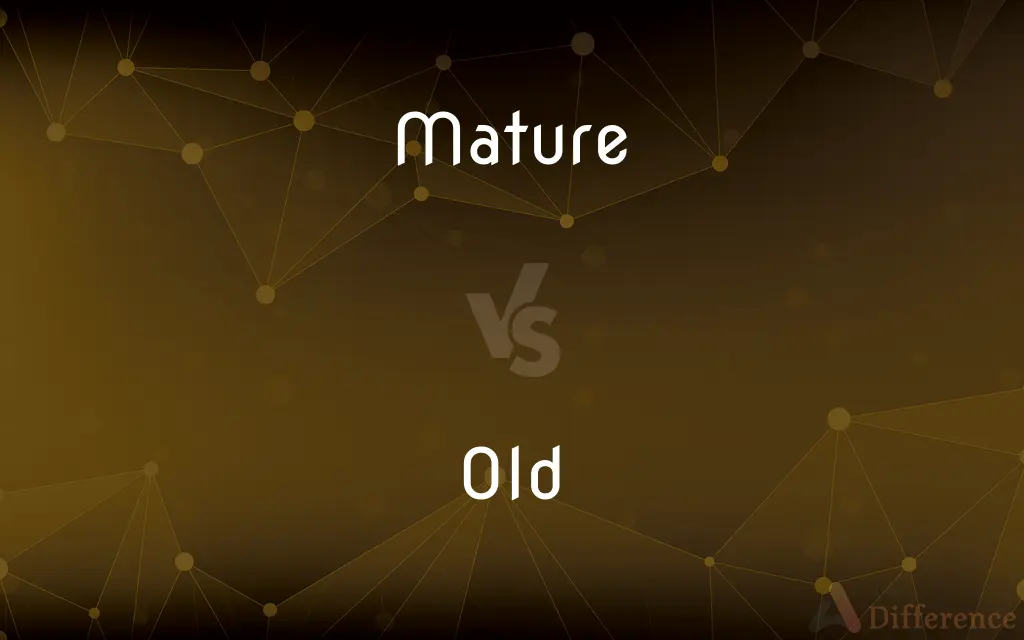Mature vs. Old — What's the Difference?
By Fiza Rafique & Urooj Arif — Updated on March 27, 2024
Mature refers to something or someone fully developed, while old indicates something or someone of an advanced age or era.

Difference Between Mature and Old
Table of Contents
ADVERTISEMENT
Key Differences
While maturity can denote a qualitative aspect of growth and development, reaching a level of sophistication or readiness, oldness is quantitatively measured by time. A wine may become mature, developing a complex bouquet and depth of flavor desired by connoisseurs, whereas an old wine might have surpassed its peak drinking window, losing its desired qualities.
The concept of maturity is often applied to living beings or systems, suggesting a readiness or completion of growth phases. Mature individuals are generally considered capable of complex reasoning and emotional regulation. In contrast, old age is universally applied, denoting a later period in the lifecycle, often associated with wisdom gained through experience but also with physical and sometimes cognitive decline.
Maturity and old age carry distinct social and cultural connotations. In many societies, maturity is a valued trait, associated with responsibility and reliability, while old age can be viewed with reverence or, conversely, with negativity, focusing on loss of youth and decline.
In technology and products, maturity indicates a state of optimization and reliability achieved after initial development and growth phases, highlighting functionality and refinement. An old technology or product, however, is characterized by obsolescence or being outdated, surpassed by newer advancements.
Comparison Chart
Definition
Fully developed in growth, complexity.
Having lived or existed for a long time.
ADVERTISEMENT
Context
Biological, emotional, intellectual growth.
Time-based, often implying decline.
Connotations
Readiness, sophistication.
Age, possibly decline or obsolescence.
Application
Living beings, ecosystems, technology.
Lifespan, objects, technology.
Social/Cultural View
Often positive, denoting development.
Mixed, can be negative or positive.
Compare with Definitions
Mature
Fully developed physically.
Mature trees dominate the old forest.
Old
Having lived for a long time. no longer young.
The old man shared his wisdom with the youth.
Mature
Reached the most advanced stage in a process.
The technology is now mature and widely adopted.
Old
Used to indicate something familiar or long-known.
She revisited her old neighborhood.
Mature
Fully considered and perfected.
His mature works are his most compelling.
Old
Belonging to the past.
Old traditions still play a vital role in their culture.
Mature
Wine or cheese developed to the desired condition.
The cheese is mature and ready for sale.
Old
Of or relating to the latter part of life or existence.
Old age brings with it a unique set of challenges.
Mature
Having reached full natural growth or development
A mature cell.
Old
Showing signs of age or wear.
The old jacket was frayed but comfortable.
Mature
Having reached a desired or final condition; ripe
A mature cheese.
Old
Having lived for a long time; no longer young
The old man lay propped up on cushions
Mature
Worked out fully by the mind; considered
A mature plan of action.
Old
Belonging to the past; former
Valuation under the old rating system was inexact
Mature
Having reached the limit of its time; due
A mature bond.
Old
Of a specified age
A seven-month-old baby
He was fourteetn years old
Mature
No longer subject to great expansion or development. Used of an industry, market, or product.
Old
Used to express affection, familiarity, or contempt
Good old Mum
I didn't like playing with silly old dolls
Mature
(Geology) Having reached maximum development of form. Used of streams and landforms.
Old
Having lived or existed for a relatively long time; far advanced in years or life.
Mature
To bring to full development; ripen.
Old
Relatively advanced in age
Pamela is our oldest child.
Mature
To work out fully in the mind
"able to digest and mature my thoughts for my own mind only" (John Stuart Mill).
Old
Made long ago; in existence for many years
An old book.
Mature
To evolve toward or reach full development
The child's judgment matures as she grows older.
Old
Of or relating to a long life or to people who have had long lives
A ripe old age.
Mature
To become due. Used of notes and bonds.
Old
Having or exhibiting the physical characteristics of age
A prematurely old face.
Mature
Fully developed; grown up in terms of physical appearance, behaviour or thinking; ripe.
She is quite mature for her age.
The excellent mature eggplants grown in the garden plot are quickly being being picked up by family and friends.
Old
Having or exhibiting the wisdom of age; mature
A child who is old for his years.
Mature
Brought to a state of complete readiness.
A mature plan
Old
Having lived or existed for a specified length of time
She was 12 years old.
Mature
Profound; careful.
The headmaster decided to expel the boy after a mature consideration.
Old
Exhibiting the effects of time or long use; worn
An old coat.
Mature
Come to, or in a state of, completed suppuration.
Old
Known through long acquaintance; long familiar
An old friend.
Mature
(intransitive) To proceed toward maturity: full development or completion (either of concrete or of abstract things, e.g. plans, judgments, qualities).
Old
Skilled or able through long experience; practiced
He is an old hand at doing home repairs.
Mature
To attain maturity, to become mature or ripe.
Old
Belonging to a remote or former period in history; ancient
Old fossils.
Mature
(transitive) To bring (something) to maturity, full development, or completion.
Old
Belonging to or being of an earlier time
Her old classmates.
Mature
(transitive) To make (something, e.g. fruit) ripe or mature.
Old
Often Old Being the earlier or earliest of two or more related objects, stages, versions, or periods.
Mature
To proceed toward or become mature or full-grown, either physically or psychologically; to gain experience or wisdom with age.
Old
Having become slower in flow and less vigorous in action. Used of a river.
Mature
(transitive) To make (someone) mature.
Old
Having become simpler in form and of lower relief. Used of a landform.
Mature
To reach the date when payment is due.
When the bond matures, the full face value is payable to its bearer.
Old
Used as an intensive
Come back any old time. Don't give me any ol' excuse.
Mature
Brought by natural process to completeness of growth and development; fitted by growth and development for any function, action, or state, appropriate to its kind; full-grown; ripe.
Now is love mature in ear.
How shall I meet, or how accost, the sage,Unskilled in speech, nor yet mature of age?
Old
Used to express affection or familiarity
Good ol' Sam.
Mature
Completely worked out; fully digested or prepared; ready for action; made ready for destined application or use; perfected; as, a mature plan.
This lies glowing, . . . and is almost mature for the violent breaking out.
Old
An individual of a specified age
A five-year-old.
Mature
Of or pertaining to a condition of full development; as, a man of mature years.
Old
Old people considered as a group. Used with the
Caring for the old.
Mature
Come to, or in a state of, completed suppuration.
Old
Former times; yore
In days of old.
Mature
To bring or hasten to maturity; to promote ripeness in; to ripen; to complete; as, to mature one's plans.
Old
Of an object, concept, relationship, etc., having existed for a relatively long period of time.
An old abandoned building
An old friend
Mature
To advance toward maturity; to become ripe; as, wine matures by age; the judgment matures by age and experience.
Old
Of a living being, having lived for most of the expected years.
A wrinkled old man
Mature
Hence, to become due, as a note.
Old
Of a perishable item, having existed for most of, or more than, its shelf life.
An old loaf of bread
Mature
Develop and reach maturity; undergo maturation;
He matured fast
The child grew fast
Old
Of a species or language, belonging to a lineage that is distantly related others
The ginkgo is one of the oldest living trees
Basque is the oldest language in Europe
Mature
Develop and work out fully in one's mind;
I need to mature my thoughts
Old
Having been used and thus no longer new or unused.
I find that an old toothbrush is good to clean the keyboard with.
Mature
Become due for repayment;
These bonds mature in 2005
Old
Having existed or lived for the specified time.
How old are they? She’s five years old and he's seven. We also have a young teen and a two-year-old child.
My great-grandfather lived to be a hundred and one years old.
Mature
Cause to ripen or develop fully;
The sun ripens the fruit
Age matures a good wine
Old
(heading) Of an earlier time.
Mature
Grow old or older;
She aged gracefully
We age every day--what a depressing thought!
Young men senesce
Old
Former, previous.
My new car is not as good as my old one.
A school reunion for Old Etonians
Mature
Cause to ripen and discharge pus;
The oil suppurates the pustules
Old
That is no longer in existence.
The footpath follows the route of an old railway line.
Mature
Characteristic of maturity;
Mature for her age
Old
Obsolete; out-of-date.
That is the old way of doing things; now we do it this way.
Mature
Fully considered and perfected;
Mature plans
Old
Familiar.
When he got drunk and quarrelsome they just gave him the old heave-ho.
Mature
Having reached full natural growth or development;
A mature cell
Old
(UK) Being a graduate or alumnus of a school, especially a public school.
Mature
Fully developed or matured and ready to be eaten or used;
Ripe peaches
Full-bodies mature wines
Old
Tiresome after prolonged repetition.
Your constant pestering is getting old.
Mature
(of birds) having developed feathers or plumage; often used in combination
Old
Said of subdued colors, particularly reds, pinks and oranges, as if they had faded over time.
Old
A grammatical intensifier, often used in describing something positive, and combined with another adjective.
We're having a good old time.
My next car will be a big old SUV.
My wife makes the best little old apple pie in Texas.
Any old
Old
(obsolete) Excessive, abundant.
Old
|invariable plural only}} People who are old; old beings; the older generation, taken as a group.
A civilised society should always look after the old in the community.
Old
One's parents.
I had to sneak out to meet my girlfriend and tell the olds I was going to the library.
Old
A typically dark-coloured lager brewed by the traditional top-fermentation method.
Old
Open country.
Old
Not young; advanced far in years or life; having lived till toward the end of the ordinary term of living; as, an old man; an old age; an old horse; an old tree.
Let not old age disgrace my high desire.
The melancholy news that we grow old.
Old
Not new or fresh; not recently made or produced; having existed for a long time; as, old wine; an old friendship.
Old
Formerly existing; ancient; not modern; preceding; original; as, an old law; an old custom; an old promise.
Old
Continued in life; advanced in the course of existence; having (a certain) length of existence; - designating the age of a person or thing; as, an infant a few hours old; a cathedral centuries old.
And Pharaoh said unto Jacob, How old art thou?
Old
Long practiced; hence, skilled; experienced; cunning; as, an old offender; old in vice.
Vane, young in years, but in sage counsel old.
Old
Long cultivated; as, an old farm; old land, as opposed to new land, that is, to land lately cleared.
Old
Worn out; weakened or exhausted by use; past usefulness; as, old shoes; old clothes.
Old
More than enough; abundant.
If a man were porter of hell gate, he should have old turning the key.
Old
Aged; antiquated; hence, wanting in the mental vigor or other qualities belonging to youth; - used disparagingly as a term of reproach.
Old
Old-fashioned; wonted; customary; as of old; as, the good old times; hence, colloquially, gay; jolly.
Old
Used colloquially as a term of cordiality and familiarity.
Old
Past times (especially in the phrase `in days of old')
Old
(used especially of persons) having lived for a relatively long time or attained a specific age; especially not young; often used as a combining form to indicate an age as specified as in `a week-old baby';
An old man's eagle mind
His mother is very old
A ripe old age
How old are you?
Old
Of long duration; not new;
Old tradition
Old house
Old wine
Old country
Old friendships
Old money
Old
Of an earlier time;
His old classmates
Old
(used for emphasis) very familiar;
Good old boy
Same old story
Old
Lacking originality or spontaneity; no longer new;
Moth-eaten theories about race
Old
Just preceding something else in time or order;
The previous owner
My old house was larger
Old
Of a very early stage in development;
Old English is also called Anglo Saxon
Old High German is High German from the middle of the 9th to the end of the 11th century
Old
Old in experience;
An old offender
The older soldiers
Old
Used informally especially for emphasis;
A real honest-to-god live cowboy
Had us a high old time
Went upriver to look at a sure-enough fish wheel
Common Curiosities
What distinguishes a mature wine from an old wine?
A mature wine has developed a desirable complexity and balance, while an old wine may have passed its peak and lost quality.
How does society view maturity versus old age?
Society often values maturity for its association with development and sophistication, whereas views on old age can vary, from reverence for wisdom gained to concerns over decline.
Is it possible for a technology to be mature?
Yes, technology is considered mature when it has gone through growth phases and reached optimization, offering reliability and functionality.
Is there a way to accelerate maturity in wine or cheese?
Certain techniques and conditions can influence the maturation process of wine and cheese, but true quality often requires time and cannot be rushed.
Can something be old but not mature?
Yes, objects or technologies can be old without being mature, as oldness refers to the passage of time, while maturity involves development and refinement.
What does it mean for a person to be mature?
Being mature means having reached full physical or emotional development, displaying qualities such as wisdom, emotional regulation, and informed decision-making.
Does maturity always come with age?
Not necessarily; while age can contribute to experiences that foster maturity, maturity itself depends on personal growth, learning, and emotional development.
Can a society or culture be described as mature?
Yes, a society or culture can be described as mature when it demonstrates tolerance, inclusivity, stability, and a well-developed sense of community and social responsibility.
How do perceptions of old age vary across cultures?
Perceptions vary widely; some cultures revere the elderly for their wisdom and experience, while others may prioritize youth and innovation, viewing old age more negatively.
What are the indicators of maturity in a person?
Indicators include emotional stability, rational decision-making, empathy, self-awareness, and the ability to handle responsibilities effectively.
What is the difference between being old-fashioned and being mature?
Being old-fashioned refers to adhering to ways of the past, often resistant to change, while being mature involves a developed, refined state of mind or method that is not necessarily resistant to innovation.
How can an old object be valued?
Old objects can be valued for their historical significance, craftsmanship, rarity, or the stories and memories they embody.
Can technology become too old to be useful?
Yes, as advancements are made, older technologies can become obsolete, unable to perform efficiently or support new standards and expectations.
What role does maturity play in leadership?
Maturity in leadership is crucial for making balanced decisions, managing conflicts, inspiring trust, and guiding teams with wisdom and empathy.
How does one measure the maturity of a product or technology?
Maturity is measured by its reliability, stability, and the degree to which it meets the needs it was designed for, often assessed through user feedback, performance metrics, and its integration into existing systems.
Share Your Discovery

Previous Comparison
Unidealized vs. Idealized
Next Comparison
Lack vs. NeedAuthor Spotlight
Written by
Fiza RafiqueFiza Rafique is a skilled content writer at AskDifference.com, where she meticulously refines and enhances written pieces. Drawing from her vast editorial expertise, Fiza ensures clarity, accuracy, and precision in every article. Passionate about language, she continually seeks to elevate the quality of content for readers worldwide.
Co-written by
Urooj ArifUrooj is a skilled content writer at Ask Difference, known for her exceptional ability to simplify complex topics into engaging and informative content. With a passion for research and a flair for clear, concise writing, she consistently delivers articles that resonate with our diverse audience.















































